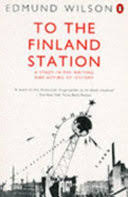I have no idea why I bought this book, or when. I assume that I thought it was mostly about Lenin, and how he got to the point in April 1917 that he arrived at the Finland Station in Petrograd and revved up the Bolsheviks to commit further revolution.
It does have that. But a lot of the book is about the development of revolutionary sentiment more broadly in Europe in the 19th century… or the consequences of revolution… actually, thinking back, it’s a bit confused. And apparently it’s a great classic, which… I am unconvinced by. Maybe I’m out of the appropriate context to really appreciate it.
Turns out the book was written in 1940, which is all sorts of interesting given that it’s by an American, during World War 2 (although before American involvement), and before the Cold War. This date also means the style is not quite what I am used to, and therefore not always enjoyable or easy to read. And there are some seriously cringeworthy aspects too, like Wilson’s insistence on attributing certain things to a stereotyped national character, in both appearance and personality. And the worst times he does this are in relation to Jewish people – Marx, and Trotsky. I found it deeply distasteful; I can’t imagine what it would be like as, you know, a Jewish reader. (Well, I can; if you are Jewish, probably don’t read this.)
The first part of the book focuses on some French authors, the only one of whom I’ve heard of is Michelet. It examines their attitudes towards the French Revolution and suggests the ways that the 19th century changes how many French regarded their first revolution. I’m really not sure what the whole point of this section was, in retrospect. It was interesting to learn that attitudes changed, but I don’t really see how this led to the development of socialism. This development is the focus of the middle half, and was genuinely interesting – I think socialism is one of the most interesting of political ideologies and the different ways people have thought about it and considered its real-world application is fascinating. There is, of course, a significant amount of space devoted to Marx and Engels. I actually knew very little about the two men and their working relationship so that aspect was revelatory – Engels compelled to work as a bourgeois manager basically to support Marx! Marx a deeply unpleasant fellow (this does not surprise me)! I started getting my hopes up that Wilson wold give me a good overview of Marx&Engels’ communism; and while I do now understand the issue of dialectic materialism (… well, ish), without a more thorough grounding in Hegel I’m still in the dark about some of the finer points. As are most people, I think. Possibly including Marx.
The final section of the book is about Lenin and Trotsky (Ulyanov and Bronstein). I don’t know too much about the early lives of the men, so that biographical aspect was again quite interesting. Wilson was surprisingly favourable towards Lenin – the introduction to the book makes excuses for this, pointing out Wilson’s lack of access to sources given when he was writing, and providing some examples of Lenin being a right horror, as balance. I did not, in the end, feel like I got much more of a grasp of Lenin and Trotsky’s politics, which is interesting to reflect on.
I think I’m ok with having read this, having already read a lot around both the French and Russian Revolutions. I won’t be recommending it to anyone, though, except for historical reasons – that is, understanding what someone in 1940 thought about it all.
